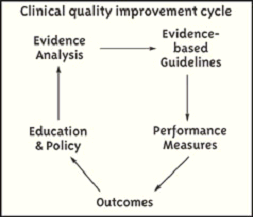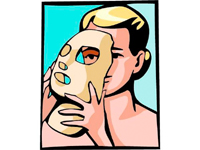|
|
Cultural Knowing: Professional and Research Culture
 Like many other work-related cultures, nursing has worked hard to be accepted as a legitimate profession and discipline. Two key methods used to achieve this are theory development and research. Early nursing theory and research were centered in the physical sciences and behaviourism, but towards the last quarter of the 20th century, the focus moved to the social sciences, making qualitative study equal to, if not stronger than quantitative work. “In the transition, the sense of 'understanding' became less of a way of knowing and more of a way of being in the world” (Cushing, 1994, p. 408). In all aspects of nursing culture, including education and practice, nursing theory and research has struggled to shift from the margins to the central regions. Like many other work-related cultures, nursing has worked hard to be accepted as a legitimate profession and discipline. Two key methods used to achieve this are theory development and research. Early nursing theory and research were centered in the physical sciences and behaviourism, but towards the last quarter of the 20th century, the focus moved to the social sciences, making qualitative study equal to, if not stronger than quantitative work. “In the transition, the sense of 'understanding' became less of a way of knowing and more of a way of being in the world” (Cushing, 1994, p. 408). In all aspects of nursing culture, including education and practice, nursing theory and research has struggled to shift from the margins to the central regions.
Disciplinary Power
 Theorists like Meleis and Im addressed the marginalization of nursing that stemmed from the belief that nursing was/is not a true profession, which makes nurses feel peripheralized within the health care system, especially in relation to power, decision-making, and autonomy. They have worked diligently to change this perspective by attempting to articulate universal nursing theory and research that uniquely demonstrates the domain of nursing culture and knowledge in context. “Knowledge also develops in resistance to the limits set by the power relations, particularly when there is an awareness of the effect of power on the nature of knowledge, and when this awareness translates to strategies to change or transcend the power differential” (1999, p. 98). Inherent in this work is the reshaping of the ideology that governs health care, and overshadows nursing culture. “Ideology is a means of maintaining power at the expense of those with less power. Power, ideology, and conflict are always closely connected” (Taylor, 1997, p. 443). Theorists like Meleis and Im addressed the marginalization of nursing that stemmed from the belief that nursing was/is not a true profession, which makes nurses feel peripheralized within the health care system, especially in relation to power, decision-making, and autonomy. They have worked diligently to change this perspective by attempting to articulate universal nursing theory and research that uniquely demonstrates the domain of nursing culture and knowledge in context. “Knowledge also develops in resistance to the limits set by the power relations, particularly when there is an awareness of the effect of power on the nature of knowledge, and when this awareness translates to strategies to change or transcend the power differential” (1999, p. 98). Inherent in this work is the reshaping of the ideology that governs health care, and overshadows nursing culture. “Ideology is a means of maintaining power at the expense of those with less power. Power, ideology, and conflict are always closely connected” (Taylor, 1997, p. 443).
 Foucault (1982) wrote about disciplinary power as a very important form of power that emerged in 17th century Europe and gained ground quickly in the modern Western world. He observed that despite its often being seen as repressive in nature, this kind of power is also productive in advancing the disciplinary culture of an emerging discipline/profession (Holmes & Gastaldo, 2002). Disciplinary power is used to influence individuals or groups to “produce effects on their conduct, habits, and attitudes in order to help them achieve particular skills and new ways of thinking or to render them ready for instruction” (p. 561). Foucault (1982) wrote about disciplinary power as a very important form of power that emerged in 17th century Europe and gained ground quickly in the modern Western world. He observed that despite its often being seen as repressive in nature, this kind of power is also productive in advancing the disciplinary culture of an emerging discipline/profession (Holmes & Gastaldo, 2002). Disciplinary power is used to influence individuals or groups to “produce effects on their conduct, habits, and attitudes in order to help them achieve particular skills and new ways of thinking or to render them ready for instruction” (p. 561).
Disciplinary power operates through distinct activities including:
- hierarchical observation (unrelenting surveillance of captive clients, clients at risk, communities)
- normalizing judgment (creation of norms)
- examination (clinical gaze, use of time and space, creation of individual cases).
 A large per cent of current nursing theory and research focuses on holistic models of nursing care that are centred around the 'lived experience' of health and health challenges and locates illness as only one part of a complex matrix. Recent nursing research addresses the phenomenology of the client and their experience in the health care system. (May & Fleming, 1997). The discourses that frame nursing literature and practice experiences give meaning and provide ways to conceptualize professional relations, aspirations, and achievements. They provide strategic language that serves to connect professional identity, knowledge, and power. “The discourse of holism with its focus on the 'lived experience' or phenomenology of patienthood is reflected across the range of narratives, institutional and personal, that characterize the professional imagination” (p. 1098). Narratives within the discourse act as cultural resources to convey the essence of disciplinary and professional acts. Yet, the reality of the nursing culture manifested often is not reflective of this holistic centre (Wolf, 1988). A large per cent of current nursing theory and research focuses on holistic models of nursing care that are centred around the 'lived experience' of health and health challenges and locates illness as only one part of a complex matrix. Recent nursing research addresses the phenomenology of the client and their experience in the health care system. (May & Fleming, 1997). The discourses that frame nursing literature and practice experiences give meaning and provide ways to conceptualize professional relations, aspirations, and achievements. They provide strategic language that serves to connect professional identity, knowledge, and power. “The discourse of holism with its focus on the 'lived experience' or phenomenology of patienthood is reflected across the range of narratives, institutional and personal, that characterize the professional imagination” (p. 1098). Narratives within the discourse act as cultural resources to convey the essence of disciplinary and professional acts. Yet, the reality of the nursing culture manifested often is not reflective of this holistic centre (Wolf, 1988).
Evidence Based Practice
 “Professional culture is a form of professional life comprised of a cluster of material and symbolic practices organized around a body of specialized knowledge shared by a group of qualified professionals” (Hong, 2001, p. 5). A strong move towards the use of research and theory in practice dominants current nursing literature (Eriksson, 2002). Nurses are now expected to apply research findings to their practice despite the harried pace they routinely work within (Hallam, 2000). There is a strong emphasis on “the need to create a positive research culture, a whole system where research is perceived more favourably, and used more proactively by the majority of practitioners. Strategies must be grounded in an appreciation of this research culture” (Le May, Mulhall & Alexander, 1998, p. 429). “Professional culture is a form of professional life comprised of a cluster of material and symbolic practices organized around a body of specialized knowledge shared by a group of qualified professionals” (Hong, 2001, p. 5). A strong move towards the use of research and theory in practice dominants current nursing literature (Eriksson, 2002). Nurses are now expected to apply research findings to their practice despite the harried pace they routinely work within (Hallam, 2000). There is a strong emphasis on “the need to create a positive research culture, a whole system where research is perceived more favourably, and used more proactively by the majority of practitioners. Strategies must be grounded in an appreciation of this research culture” (Le May, Mulhall & Alexander, 1998, p. 429).
In order to promote the application of evidence based practice, nursing leaders and theorists have attempted to promote a change in nursing culture. “Changing the culture is sometimes necessary for revitalization. This needs to take account of factors such as: the dominant ideology, the locus of power and decision making, the organizational structure, career opportunities and paths, communication, heroes and villains, stories and anecdotes, rites and rituals, and image” (Thompson, 2003, p. 144). In response to this process, LeMay et al (1998) asked an important question:  “Do practitioners feel pressured by the current culture of nursing which is urging them to base their practice on research?” (p. 434). The boundaries and constituents of professional nursing culture are still fragile, and sometimes difficult to enact due to the demands and regulation imposed by organizational culture. The move to evidence based nursing is promoted in the nursing literature as a sound method for improving client care and addressing the theory-practice gap. However, it is also an initiative now supported and postulated by many organizations, but usually without the necessary resources, such as easy access to research findings, extra time for study, or workload adjustments. Thus, evidence based practice often becomes just another modernist method of control and stress for nursing culture participants that is added on to their already overwhelming case load. “Do practitioners feel pressured by the current culture of nursing which is urging them to base their practice on research?” (p. 434). The boundaries and constituents of professional nursing culture are still fragile, and sometimes difficult to enact due to the demands and regulation imposed by organizational culture. The move to evidence based nursing is promoted in the nursing literature as a sound method for improving client care and addressing the theory-practice gap. However, it is also an initiative now supported and postulated by many organizations, but usually without the necessary resources, such as easy access to research findings, extra time for study, or workload adjustments. Thus, evidence based practice often becomes just another modernist method of control and stress for nursing culture participants that is added on to their already overwhelming case load.
Reflection and Praxis
 Another emerging cultural norm that has gained popularity in nursing literature and in organizational culture is the practice of reflection and praxis. Taught in most nursing educational programs, reflection is a process “undertaken in order to gain understanding, insight, and new knowledge about practice. Because of this it is often called praxis” (McKenna, 1999, p. 148). Reflection combines Habermas' (2003) critical philosophy and Bourdieu's (2000) theory of practice where nursing practice is “viewed as a form of social life, in which different forms of domination, distortion, and misunderstandings are possible” (Kim, 1999, p. 1206). Nurses need time and space in order to reflect well: to integrate and dwell on their intuitions, experiences, knowledge, and the situation at hand. “It encompasses both reflection-in-action focusing on the process of knowledge-use-in-action and reflection-on-action, focusing on the mode with which professionals gain additional knowledge from their experiences” (p. 1206). Another emerging cultural norm that has gained popularity in nursing literature and in organizational culture is the practice of reflection and praxis. Taught in most nursing educational programs, reflection is a process “undertaken in order to gain understanding, insight, and new knowledge about practice. Because of this it is often called praxis” (McKenna, 1999, p. 148). Reflection combines Habermas' (2003) critical philosophy and Bourdieu's (2000) theory of practice where nursing practice is “viewed as a form of social life, in which different forms of domination, distortion, and misunderstandings are possible” (Kim, 1999, p. 1206). Nurses need time and space in order to reflect well: to integrate and dwell on their intuitions, experiences, knowledge, and the situation at hand. “It encompasses both reflection-in-action focusing on the process of knowledge-use-in-action and reflection-on-action, focusing on the mode with which professionals gain additional knowledge from their experiences” (p. 1206).
Nursing culture is expected to exhibit the behaviours and outcomes of reflection and praxis within their day-to-day practice as well as perform the daily tasks of client care. This process is promoted in the nursing literature as encompassing three critical phases:
 - Descriptive Phase: The nurse describes specific instances of practice (narratives) including actions, thoughts, feelings, circumstances, features of situation. This is an analytical phase, where the nurse becomes engaged in conscious efforts to view self and their actions
- Reflective Phase: Narratives are reflected on and compared to the nurse's personal beliefs, assumptions and knowledge. The nurse reflects on standards and theories, situation, and intentions. This is the basic premise of action science where nursing practice involves three aspects, scientific, ethical and aesthetic.
- Critical/Emanicipatory Phase: The nurse corrects or changes less-than-good or ineffective practice, moving forward to the future, and assimilates new innovations that emerge from practice. (Kim, 1999, p. 1208).
Through critical reflection, nurses are able to recover and examine the historical and developmental circumstances which shape nursing's cultural “ideas, institutions, and modes of action, as a basis for formulating more rational ideas, more just institutions, and more fulfilling forms of action” (McKenna, 1999, p. 150).
 Cotton (2002) described the current emphasis on reflective practice in nursing as an essentially modernist, disempowering and devaluing experience by arguing that reflective practice imposes a degree of surveillance on health care professionals and represents a postmodern ‘technology of power’. If nurses are expected to combine reflection and praxis, evidence based practice, and exert disciplinary power in a client-centered, supportive manner, changes are needed in the organizational, health care, and nursing cultures: changes that afford nursing the luxury of time, space, equality, and resources to practice as they were educated to do: in a phenomenological, respectful, mindful way that offers full support to clients without controlling the client's ability to choose, act, and heal in their own unique way (Brencick & Webster, 2000). Cotton (2002) described the current emphasis on reflective practice in nursing as an essentially modernist, disempowering and devaluing experience by arguing that reflective practice imposes a degree of surveillance on health care professionals and represents a postmodern ‘technology of power’. If nurses are expected to combine reflection and praxis, evidence based practice, and exert disciplinary power in a client-centered, supportive manner, changes are needed in the organizational, health care, and nursing cultures: changes that afford nursing the luxury of time, space, equality, and resources to practice as they were educated to do: in a phenomenological, respectful, mindful way that offers full support to clients without controlling the client's ability to choose, act, and heal in their own unique way (Brencick & Webster, 2000).
|
|
|
|

|



 Like many other work-related cultures, nursing has worked hard to be accepted as a legitimate profession and discipline. Two key methods used to achieve this are theory development and research. Early nursing theory and research were centered in the physical sciences and behaviourism, but towards the last quarter of the 20th century, the focus moved to the social sciences, making qualitative study equal to, if not stronger than quantitative work. “In the transition, the sense of 'understanding' became less of a way of knowing and more of a way of being in the world” (Cushing, 1994, p. 408). In all aspects of nursing culture, including education and practice, nursing theory and research has struggled to shift from the margins to the central regions.
Like many other work-related cultures, nursing has worked hard to be accepted as a legitimate profession and discipline. Two key methods used to achieve this are theory development and research. Early nursing theory and research were centered in the physical sciences and behaviourism, but towards the last quarter of the 20th century, the focus moved to the social sciences, making qualitative study equal to, if not stronger than quantitative work. “In the transition, the sense of 'understanding' became less of a way of knowing and more of a way of being in the world” (Cushing, 1994, p. 408). In all aspects of nursing culture, including education and practice, nursing theory and research has struggled to shift from the margins to the central regions.  Theorists like Meleis and Im addressed the marginalization of nursing that stemmed from the belief that nursing was/is not a true profession, which makes nurses feel peripheralized within the health care system, especially in relation to power, decision-making, and autonomy. They have worked diligently to change this perspective by attempting to articulate universal nursing theory and research that uniquely demonstrates the domain of nursing culture and knowledge in context. “Knowledge also develops in resistance to the limits set by the power relations, particularly when there is an awareness of the effect of power on the nature of knowledge, and when this awareness translates to strategies to change or transcend the power differential” (1999, p. 98). Inherent in this work is the reshaping of the ideology that governs health care, and overshadows nursing culture. “Ideology is a means of maintaining power at the expense of those with less power. Power, ideology, and conflict are always closely connected” (Taylor, 1997, p. 443).
Theorists like Meleis and Im addressed the marginalization of nursing that stemmed from the belief that nursing was/is not a true profession, which makes nurses feel peripheralized within the health care system, especially in relation to power, decision-making, and autonomy. They have worked diligently to change this perspective by attempting to articulate universal nursing theory and research that uniquely demonstrates the domain of nursing culture and knowledge in context. “Knowledge also develops in resistance to the limits set by the power relations, particularly when there is an awareness of the effect of power on the nature of knowledge, and when this awareness translates to strategies to change or transcend the power differential” (1999, p. 98). Inherent in this work is the reshaping of the ideology that governs health care, and overshadows nursing culture. “Ideology is a means of maintaining power at the expense of those with less power. Power, ideology, and conflict are always closely connected” (Taylor, 1997, p. 443).  Foucault (1982) wrote about disciplinary power as a very important form of power that emerged in 17th century Europe and gained ground quickly in the modern Western world. He observed that despite its often being seen as repressive in nature, this kind of power is also productive in advancing the disciplinary culture of an emerging discipline/profession (Holmes & Gastaldo, 2002). Disciplinary power is used to influence individuals or groups to “produce effects on their conduct, habits, and attitudes in order to help them achieve particular skills and new ways of thinking or to render them ready for instruction” (p. 561).
Foucault (1982) wrote about disciplinary power as a very important form of power that emerged in 17th century Europe and gained ground quickly in the modern Western world. He observed that despite its often being seen as repressive in nature, this kind of power is also productive in advancing the disciplinary culture of an emerging discipline/profession (Holmes & Gastaldo, 2002). Disciplinary power is used to influence individuals or groups to “produce effects on their conduct, habits, and attitudes in order to help them achieve particular skills and new ways of thinking or to render them ready for instruction” (p. 561).  A large per cent of current nursing theory and research focuses on holistic models of nursing care that are centred around the 'lived experience' of health and health challenges and locates illness as only one part of a complex matrix. Recent nursing research addresses the phenomenology of the client and their experience in the health care system. (May & Fleming, 1997). The discourses that frame nursing literature and practice experiences give meaning and provide ways to conceptualize professional relations, aspirations, and achievements. They provide strategic language that serves to connect professional identity, knowledge, and power. “The discourse of holism with its focus on the 'lived experience' or phenomenology of patienthood is reflected across the range of narratives, institutional and personal, that characterize the professional imagination” (p. 1098). Narratives within the discourse act as cultural resources to convey the essence of disciplinary and professional acts. Yet, the reality of the nursing culture manifested often is not reflective of this holistic centre (Wolf, 1988).
A large per cent of current nursing theory and research focuses on holistic models of nursing care that are centred around the 'lived experience' of health and health challenges and locates illness as only one part of a complex matrix. Recent nursing research addresses the phenomenology of the client and their experience in the health care system. (May & Fleming, 1997). The discourses that frame nursing literature and practice experiences give meaning and provide ways to conceptualize professional relations, aspirations, and achievements. They provide strategic language that serves to connect professional identity, knowledge, and power. “The discourse of holism with its focus on the 'lived experience' or phenomenology of patienthood is reflected across the range of narratives, institutional and personal, that characterize the professional imagination” (p. 1098). Narratives within the discourse act as cultural resources to convey the essence of disciplinary and professional acts. Yet, the reality of the nursing culture manifested often is not reflective of this holistic centre (Wolf, 1988).  “Professional culture is a form of professional life comprised of a cluster of material and symbolic practices organized around a body of specialized knowledge shared by a group of qualified professionals” (Hong, 2001, p. 5). A strong move towards the use of research and theory in practice dominants current nursing literature (Eriksson, 2002). Nurses are now expected to apply research findings to their practice despite the harried pace they routinely work within (Hallam, 2000). There is a strong emphasis on “the need to create a positive research culture, a whole system where research is perceived more favourably, and used more proactively by the majority of practitioners. Strategies must be grounded in an appreciation of this research culture” (Le May, Mulhall & Alexander, 1998, p. 429).
“Professional culture is a form of professional life comprised of a cluster of material and symbolic practices organized around a body of specialized knowledge shared by a group of qualified professionals” (Hong, 2001, p. 5). A strong move towards the use of research and theory in practice dominants current nursing literature (Eriksson, 2002). Nurses are now expected to apply research findings to their practice despite the harried pace they routinely work within (Hallam, 2000). There is a strong emphasis on “the need to create a positive research culture, a whole system where research is perceived more favourably, and used more proactively by the majority of practitioners. Strategies must be grounded in an appreciation of this research culture” (Le May, Mulhall & Alexander, 1998, p. 429).  “Do practitioners feel pressured by the current culture of nursing which is urging them to base their practice on research?” (p. 434). The boundaries and constituents of professional nursing culture are still fragile, and sometimes difficult to enact due to the demands and regulation imposed by organizational culture. The move to evidence based nursing is promoted in the nursing literature as a sound method for improving client care and addressing the theory-practice gap. However, it is also an initiative now supported and postulated by many organizations, but usually without the necessary resources, such as easy access to research findings, extra time for study, or workload adjustments. Thus, evidence based practice often becomes just another modernist method of control and stress for nursing culture participants that is added on to their already overwhelming case load.
“Do practitioners feel pressured by the current culture of nursing which is urging them to base their practice on research?” (p. 434). The boundaries and constituents of professional nursing culture are still fragile, and sometimes difficult to enact due to the demands and regulation imposed by organizational culture. The move to evidence based nursing is promoted in the nursing literature as a sound method for improving client care and addressing the theory-practice gap. However, it is also an initiative now supported and postulated by many organizations, but usually without the necessary resources, such as easy access to research findings, extra time for study, or workload adjustments. Thus, evidence based practice often becomes just another modernist method of control and stress for nursing culture participants that is added on to their already overwhelming case load.  Another emerging cultural norm that has gained popularity in nursing literature and in organizational culture is the practice of reflection and praxis. Taught in most nursing educational programs, reflection is a process “undertaken in order to gain understanding, insight, and new knowledge about practice. Because of this it is often called praxis” (McKenna, 1999, p. 148). Reflection combines Habermas' (2003) critical philosophy and Bourdieu's (2000) theory of practice where nursing practice is “viewed as a form of social life, in which different forms of domination, distortion, and misunderstandings are possible” (Kim, 1999, p. 1206). Nurses need time and space in order to reflect well: to integrate and dwell on their intuitions, experiences, knowledge, and the situation at hand. “It encompasses both reflection-in-action focusing on the process of knowledge-use-in-action and reflection-on-action, focusing on the mode with which professionals gain additional knowledge from their experiences” (p. 1206).
Another emerging cultural norm that has gained popularity in nursing literature and in organizational culture is the practice of reflection and praxis. Taught in most nursing educational programs, reflection is a process “undertaken in order to gain understanding, insight, and new knowledge about practice. Because of this it is often called praxis” (McKenna, 1999, p. 148). Reflection combines Habermas' (2003) critical philosophy and Bourdieu's (2000) theory of practice where nursing practice is “viewed as a form of social life, in which different forms of domination, distortion, and misunderstandings are possible” (Kim, 1999, p. 1206). Nurses need time and space in order to reflect well: to integrate and dwell on their intuitions, experiences, knowledge, and the situation at hand. “It encompasses both reflection-in-action focusing on the process of knowledge-use-in-action and reflection-on-action, focusing on the mode with which professionals gain additional knowledge from their experiences” (p. 1206). 
 Cotton (2002) described the current emphasis on reflective practice in nursing as an essentially modernist, disempowering and devaluing experience by arguing that reflective practice imposes a degree of surveillance on health care professionals and represents a postmodern ‘technology of power’. If nurses are expected to combine reflection and praxis, evidence based practice, and exert disciplinary power in a client-centered, supportive manner, changes are needed in the organizational, health care, and nursing cultures: changes that afford nursing the luxury of time, space, equality, and resources to practice as they were educated to do: in a phenomenological, respectful, mindful way that offers full support to clients without controlling the client's ability to choose, act, and heal in their own unique way (Brencick & Webster, 2000).
Cotton (2002) described the current emphasis on reflective practice in nursing as an essentially modernist, disempowering and devaluing experience by arguing that reflective practice imposes a degree of surveillance on health care professionals and represents a postmodern ‘technology of power’. If nurses are expected to combine reflection and praxis, evidence based practice, and exert disciplinary power in a client-centered, supportive manner, changes are needed in the organizational, health care, and nursing cultures: changes that afford nursing the luxury of time, space, equality, and resources to practice as they were educated to do: in a phenomenological, respectful, mindful way that offers full support to clients without controlling the client's ability to choose, act, and heal in their own unique way (Brencick & Webster, 2000).